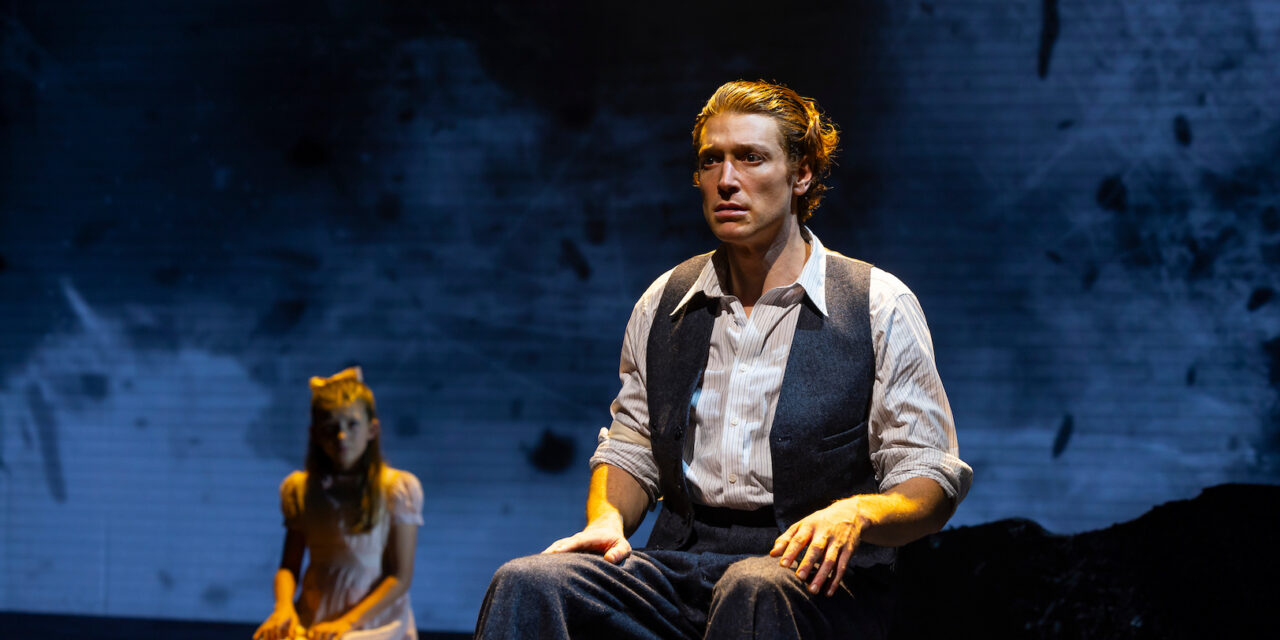By Adam Cohen . . .
George Street Playhouse presents the world premiere of The Pianist, a play with music, based on the memoir by Wladyslaw Szpilman and directed and adapted for the stage by Emily Mann.
Daniel Donskoy (A Small Light; The Crown) makes his American stage debut as Szpilman. At the moment of the 1939 Nazi invasion, Szpilman is playing the piano, broadcasting live on Warsaw radio; the studio is blown to pieces. Here, the set by Beowulf Boritt becomes ragged—an inspired image for the impingement of life on art.
Mann sets the plot in motion from the rise of the stage lights. She keeps a taut pace for the production, setting the stage with modest props—chairs, a ladder.

He and his family (Claire Beckman, Austin Pendleton, Paul Spera, Arielle Goldman, Georgia Warner) are moved into the notorious Warsaw ghetto. They refuse to join the Jewish ghetto police—but Szpilman’s celebrity nevertheless allows him to pull strings. As his family is loaded onto the cattle trucks headed for Treblinka, Szpilman is hauled off and allowed back into the devastated city. There, he fends for himself and deals with his survivor guilt as best he can.
Occupied Warsaw seems truly horrifying: the Nazis tip a wheelchair-bound old man off a balcony. The risk of being outed runs rampant, despite the amount of aid he gets from friends and sympathizers. He spends a lot of his time holed up in safe flats and, peeking out of the window, has a ringside seat at some military and rebellious action, but bears witness.
The script often lies episodic—despite the game, generous performance of Donskoy. Mann renders a Wikipedia rendition of Szpilman’s life during the war. Yes, he experiences nightmares about his family. There’s an urgency to his moving from hiding places. We hardly know his family, and they remain practically strangers to us as characters with little nuanced detail—the poet/philosopher/translator brother, piano teacher assistant sister; lawyer sister; violinist dad; piano teacher mother. Much is at risk, but not a lot of insight is provided.


Mann imbues Szpilman with a truly deft theatrical touch when it comes to the piano playing, which pays off wonderfully. But again, there is not a great deal of insight into his existence as a pianist or an artist. We briefly see his “before” life and much of his struggle to survive. Perhaps if he had moments of narrating his life not just to us, but his family members, or imagined conversations with them that were less expository, Mann might stir greater depths of emotion from the audience.
As Szpilman, Donskoy is strong, dominating the stage physically and emotionally and showing sheer terror, panic, and in the end, hope. We sense that Szpilman is a man who came early and seriously to music and has a certain aloofness to his celebrity and life around him.
Tina Benko, Robert David Grant, and Jordan Lage play many different characters—both supporters and threats to Szpilman. They often create indelible moments in their brief moments in each characterization.
The Pianist. Through October 22 at the George Street Playhouse’s New Brunswick Playhouse (11 Livingston Avenue, New Brunswick, NJ). 95 minutes, no intermission. www.georgestreetplayhouse.org
Photos: T. Charles Erickson


















